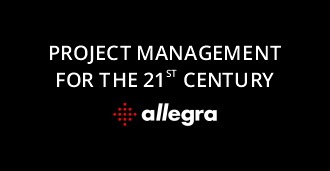What is project management?
Overview
Project management tasks
The concept of project management is derived from the term “project”. A project is according to the Project Management Institute a temporary undertaking to create a unique product or service. A project should contain novel and innovative tasks, be time-limited and have measurable goals.
Thus, project management is a systematic process that encompasses the set of management tasks, organization, techniques, and resources required to complete a project. This means that the organization, planning, monitoring and control of the tasks and resources are part of the project management. Keeping an overview of the individual tasks is the most important thing here. As a rule, projects are carried out in teams. Working as a project manager in isolation is simply impossible because communication and transparency are very important in project management.
The main goal of a project manager is to efficiently plan and manage a project so that risks are minimized and the project goals can be achieved on budget and on time.
Project Management Knowledge Areas
Project management is subdivided into 9 sub-disciplines, which are supposed to represent the different components for managing a project. This sub-divisioning was done by the PMI to provide a structured overview of the main tasks in project management.
- Scope management : Scope management manages the scope of a project by controlling requirements and checking project progress. “Is the project developing in the right direction?” is the central question here. Content and scope management includes project initiation, content and scope planning, performance definition, performance verification, and performance monitoring, so the bottom line is monitoring and controlling the project.
- Time management : Time management keeps track of the time to complete a project on time. Task definition, determination of the sequence of operations, operation duration estimation, schedule development and schedule monitoring are tasks of time management.
- Cost management : Cost management focuses on financial resources. Here, resource planning, cost estimation, budgeting and cost control are relevant.
- Integration management : Integration management includes project plan development, project plan execution, and change. Here, the processes are defined that are necessary for a good coordination and integration of different activities of a project.
- Personnel management : Personnel management deals with the employees involved in the project and their efficient project realization. Tasks here are project organization, personnel acquisition and team development.
- Quality management : Quality management includes quality planning, assurance and control. Attention is paid to the quality of the project in order to ensure the quality requirements of the client.
- Procurement management : Procurement management ensures the required external goods and services. It includes the procurement preparation or preparation of quotations, the solicitation of offers, the selection of suppliers and the contract design or fulfillment.
- Communication management: Information acquisition, distribution and progression are part of the communication management. All information regarding the project is collected, defined, disseminated and filed.
- Risk management : Risk management attempts to identify, analyze and counter project risks as a preventative measure. Risk identification, risk assessment, risk management development and risk tracking are all risk management tasks.
The Project Management Process
The PM process starts with the initiation and goes from planning, implementation and controlling to completion and the post-project phase. Experienced project managers use project management software to support them in the related activities. These subprocesses do not have to run one after the other, but can also merge into one another over time. The PM process is a common management process that can be applied to many other projects.
There are 4 phases in the PM process:
- Initiation : During the initiation, the basics of the project are formed, which also serve as a basis for decision-making. Ideas, problems and goals relevant to the project are collected, analyzed and recorded.
- Planning : During project planning project contents are specified by the project team.
- Implementation : After the planning, the implementation of the project is started. The execution is controlled by the project manager.
- Completion and, if necessary, post-project phase : After reaching the goal, an evaluation of the project result is required. These are summarized in a final report, evaluated and critically reflected. In the post-project phase, the project results will be used to possibly compare them with new similar projects.
The SMART Rule
Defining a precise daily routine for a project manager becomes very difficult. There are project managers in every industry and professional field, whose tasks and problems can be quite different. However, there is a common goal for all project managers: the successful achievement of the project goal.
For this purpose, a rule has already been developed in human resources management to serve the achievement of goals, namely the SMART rule. Goals should be formulated using these criteria: Specific, Measurable, Appealing, Realistic and Scheduled.
SMART explained
- Specific: To always ensure that everyone knows exactly what they have to do, the project manager must write plans and assign the task areas to the employees and control.
- Measurable: In order to make a project measurable, submission data must be agreed and presentations made.
- Attractive: The project manager is available to the clients as a contact person. Progress and any amendments must be communicated by him. Both external customers and their own supervisors could be the clients.
- Realistic: For a project to be realistic, much has to be planned and researched. And if that does not work, negotiations must be conducted and adjustments made to either the project or team.
- Scheduled: A project is always limited in time, so the project manager must always keep an eye on the time. There are always levies that must be respected, controlled and possibly adjusted.
Additional resources:
https://www.toolshero.com/time-management/smart-goals/




